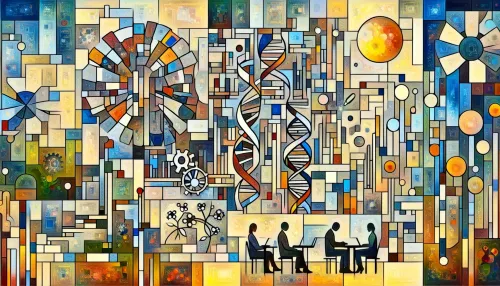Global Collaboration: Advancing Autism Research and Care Across Borders

Autism, a complex and diverse neurodevelopmental condition, is a global concern that transcends geographical boundaries. As we strive to enhance the understanding and support for autistic children worldwide, fostering cross-cultural research initiatives, promoting inclusivity, and addressing disparities become paramount. This article delves into the collaborative efforts that are revolutionizing autism research and care on a global scale.
In recent years, there has been a significant shift towards nurturing cross-cultural research initiatives in autism. Recognizing the need to encompass diverse populations in studies and clinical trials, researchers and organizations are increasingly emphasizing the inclusion of individuals from various cultural backgrounds. This approach not only enriches the pool of data but also ensures that interventions and support strategies are tailored to meet the specific needs of different cultural groups. The HorizonsMind Blog applauds these initiatives and acknowledges the value they bring to advancing autism research and care worldwide.
Fostering Cross-Cultural Research Initiatives
Collaboration knows no borders when it comes to autism research and treatment. International partnerships between institutions, professionals, and advocacy groups have paved the way for groundbreaking discoveries and innovative interventions. By leveraging expertise from different parts of the world, researchers can compare findings, share best practices, and collectively work towards improving outcomes for autistic individuals. As we recognize the immense impact of such partnerships in driving progress and creating a global network of knowledge and support.
International Partnerships in Autism Research
One of the challenges in global autism research lies in overcoming language and cultural barriers. Effective communication and collaboration demand a concerted effort to bridge linguistic gaps and respect diverse cultural norms. Researchers and clinicians are increasingly adopting inclusive practices, such as offering materials in multiple languages, involving bilingual professionals, and ensuring cultural sensitivity in study protocols. These strategies not only facilitate participation from diverse communities but also promote greater accuracy and relevance in research outcomes. The HorizonsMind Blog advocates for the elimination of language and cultural barriers in global autism research, recognizing it as a key step towards achieving comprehensive insights and impactful interventions.
Diversity is an asset in autism studies, reflecting the true spectrum of experiences and needs within the autistic community. Embracing diversity goes beyond mere representation; it involves actively seeking out underrepresented voices, addressing unique challenges faced by different demographic groups, and advocating for inclusive policies in research practices. By emphasizing the importance of promoting diversity and inclusivity in worldwide autism studies, acknowledging that meaningful progress can only be achieved by recognizing and embracing the richness of diverse perspectives.
Related Article: The Genetic Enigma of Autism: Elucidating the Role of DNA in ASD
Overcoming Language Barriers in Autism Research
Disparities in autism diagnosis and intervention persist across different regions of the world. Access to specialized diagnostic services, early intervention programs, and ongoing support varies widely, leading to inequities in outcomes for autistic children. Addressing these global disparities requires a multifaceted approach that combines awareness building, policy advocacy, resource allocation, and knowledge exchange between regions with varying levels of support infrastructure. By knowing the underscore the urgency of addressing global disparities in autism diagnosis and intervention, advocating for equitable access to quality care for all autistic individuals regardless of their geographical location.
Promoting Diversity in Autism Studies
The strength of global networks lies in their ability to amplify understanding and support for autism across borders. By connecting professionals, caregivers, self-advocates, and policymakers from diverse backgrounds, these networks facilitate knowledge sharing, collaborative projects, and collective advocacy efforts. They serve as platforms for not only disseminating evidence-based practices but also amplifying the voices of autistic individuals from all corners of the world.
Related Article: Decoding Autism: The Next Frontier in Genomic Research
Addressing Disparities in Autism Diagnosis
Through collaborative efforts that span continents, researchers are now better equipped to identify multinational trends impacting autistic children. From prevalence rates to access barriers, cultural influences to societal attitudes, these trends provide invaluable insights that inform targeted interventions and policy recommendations. By recognizing common patterns as well as unique challenges faced by different communities, stakeholders can tailor their approaches to better meet the needs of diverse populations. The HorizonsMind Blog highlights the significance of identifying multinational trends as a cornerstone of informed decision-making in supporting autistic children globally.
Cultivating global awareness is essential to fostering understanding, empathy, and action on behalf of autistic individuals worldwide. Efforts to raise awareness transcend linguistic boundaries through social media campaigns, international events, educational resources, and community engagement initiatives. They serve to destigmatize autism, promote acceptance, and underscore the capabilities and contributions of individuals on the spectrum. The HorizonsMind Blog advocates for the continual cultivation of global awareness on autism challenges and opportunities as a means to build a more supportive and inclusive world for all.
Strengthening Global Networks for Autism Support
In conclusion, The global landscape of autism research and care is undergoing a transformative evolution driven by collaborative endeavors that transcend borders. By acknowledging diversity, dismantling barriers, promoting inclusivity, addressing disparities, strengthening networks, identifying trends, and cultivating awareness on a global scale, we are collectively shaping a more informed, empathetic, and supportive environment for autistic children around the world.
Frequently Asked Questions
Overcoming language and cultural barriers in autism research involves addressing effective communication and respecting diverse cultural norms. Researchers are adopting inclusive practices, such as providing multilingual materials and involving bilingual professionals, to facilitate participation from various communities. These strategies enhance the accuracy and relevance of research outcomes, ensuring that diverse perspectives are included.
Global disparities in autism diagnosis and intervention lead to unequal access to specialized services and support. Variations in resources across regions can result in significant differences in outcomes for autistic children. Addressing these disparities requires a comprehensive approach that includes advocacy, resource allocation, and knowledge sharing to ensure equitable access to quality care for all individuals.
Cultivating global awareness is crucial for fostering understanding and empathy towards autistic individuals. Awareness initiatives, such as social media campaigns and educational resources, help destigmatize autism and promote acceptance. By highlighting the capabilities of individuals on the spectrum, these efforts contribute to building a more inclusive society that supports the needs of autistic individuals worldwide.
International partnerships enhance autism research by enabling collaboration among institutions, professionals, and advocacy groups across borders. These collaborations facilitate the sharing of expertise, comparison of findings, and collective efforts to improve outcomes for autistic individuals. By leveraging diverse knowledge, such partnerships drive innovation and create a global network dedicated to advancing autism care.
Promoting diversity in autism studies enriches research by reflecting the varied experiences within the autistic community. It involves actively seeking underrepresented voices and addressing unique challenges faced by different demographic groups. By embracing diversity, researchers can develop more effective interventions and policies that cater to the specific needs of all autistic individuals, leading to meaningful progress.
Check Out These Related Articles

Unearthing Potential: Gene Therapy's Promise in Autism Treatment

Decoding Genetic Testing for Autism: A Layman’s Guide

Illuminating Pathways in the Brain: Advances in Neurological Understanding of Autism
